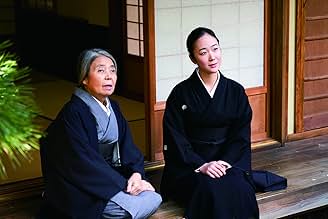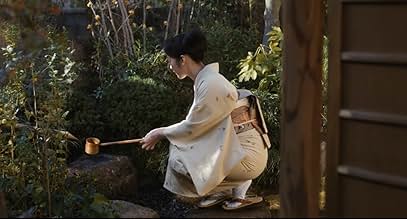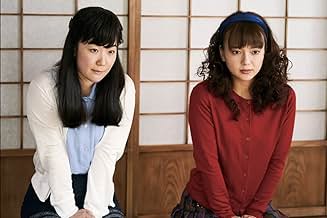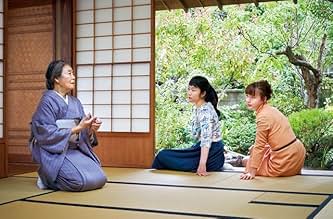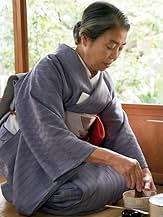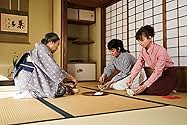NOTE IMDb
7,1/10
1,3 k
MA NOTE
Noriko et Michiko sont poussées par leurs parents vers l'art ancestral de la cérémonie du thé. Noriko découvre à travers ce rituel la saveur de l'instant présent alors que Michiko décide de ... Tout lireNoriko et Michiko sont poussées par leurs parents vers l'art ancestral de la cérémonie du thé. Noriko découvre à travers ce rituel la saveur de l'instant présent alors que Michiko décide de suivre un tout autre chemin.Noriko et Michiko sont poussées par leurs parents vers l'art ancestral de la cérémonie du thé. Noriko découvre à travers ce rituel la saveur de l'instant présent alors que Michiko décide de suivre un tout autre chemin.
- Réalisation
- Scénario
- Casting principal
- Récompenses
- 3 victoires et 2 nominations au total
Avis à la une
A lot of Japanese film makers make their 'Ozu' film, and thematically this certainly fits the Ozu mould, although perhaps wisely the film maker here doesn't try to copy the Ozu style.
The film is quite simple - it follows a young woman as she finds meaning through her weekly saturday classes on the tea ceremony. Over the years she gradually comes to appreciate the deeper meaning behind the ceremony. And that really is it. But what could be a somewhat boring film is anything but - the lovely performances and nice pacing brings us into the lives of the women who love the ceremony and it becomes all very moving, and not a little enlightening.
It is also, sadly, the last film by the great actress Kirin Kiki, but what a lovely last performance she gave us.
The film is quite simple - it follows a young woman as she finds meaning through her weekly saturday classes on the tea ceremony. Over the years she gradually comes to appreciate the deeper meaning behind the ceremony. And that really is it. But what could be a somewhat boring film is anything but - the lovely performances and nice pacing brings us into the lives of the women who love the ceremony and it becomes all very moving, and not a little enlightening.
It is also, sadly, the last film by the great actress Kirin Kiki, but what a lovely last performance she gave us.
Movie is basically about a girl who went to college, and like a lot of us had all these dreams and aspirations, but things don't go her way. She ends up taking a green tea class mostly because there isn't anything to do, and she eventually finds herself spending the next 20+ years learning it.
She sees her friends move on in life, get married, but she has no luck.
It is a heartwarming movie with a bittersweet ending.
8/10.
She sees her friends move on in life, get married, but she has no luck.
It is a heartwarming movie with a bittersweet ending.
8/10.
This is a movie in which life is a bowl of green tea. The Japanese tea ceremony becomes a philosophical and ritualistic approach to honor, to respect, to become harmonious and exacting as a mirrored counter part of the cyclical and seasonal changes in life where things are repetitive and yet imperceptibly different as time goes by. There is a moment in the film in which the camera seemingly detached itself from the story and zooms into the level of pulsating cells of a leaf. That out of context moment is exactly what this film is about. Life!
This was so relaxing, peaceful a graceful, yet carried some strong messages. Beautifully executed and directed. I will probably watch this again. Maybe even more than once more.
Nichi Nichi Kore Kojitsu - Every day a good day.
(100 minutes)
One Japanese college student - Noriko, who was about to graduate the following year, has always been viewed as dull and having little achievements in life, was once recommended by her mother to attend Chado class, learning about the traditional tea ceremony, not knowing that it would benefit a great deal and account for her sanctuary to pursue happiness one day.
The movie quite actually portrayed different areas of life throughout her bad days and her good days without focusing on them in accordance with the way of tea, but it unfolded them one event at a time for us to sense its purpose and to figure out how to polish self-awareness towards self-fulfilment.
Chado is a complex series of movements you can absorb very little from it if you overanalyze or to the contrary, overlook, too often. It's hard to learn by heart if your mind keeps asking why. Merely like how we form our perception, as a watcher, we would look at this tea drinking experience from the harmonious balance conducted between guest, host and natural surroundings; from accompanying elements such as the bowls, the sweets, or the wooden tea room's ink painting; but most satisfying above all, from the stillness in the nick of time between passing and arriving seasons. We would enjoy it to the fullest if we centralize ourselves in it.
It took Noriko 24 years later to genuinely understand the meaning of "Every day is a good day" but she was eventually able to have realized her dream.
One Japanese college student - Noriko, who was about to graduate the following year, has always been viewed as dull and having little achievements in life, was once recommended by her mother to attend Chado class, learning about the traditional tea ceremony, not knowing that it would benefit a great deal and account for her sanctuary to pursue happiness one day.
The movie quite actually portrayed different areas of life throughout her bad days and her good days without focusing on them in accordance with the way of tea, but it unfolded them one event at a time for us to sense its purpose and to figure out how to polish self-awareness towards self-fulfilment.
Chado is a complex series of movements you can absorb very little from it if you overanalyze or to the contrary, overlook, too often. It's hard to learn by heart if your mind keeps asking why. Merely like how we form our perception, as a watcher, we would look at this tea drinking experience from the harmonious balance conducted between guest, host and natural surroundings; from accompanying elements such as the bowls, the sweets, or the wooden tea room's ink painting; but most satisfying above all, from the stillness in the nick of time between passing and arriving seasons. We would enjoy it to the fullest if we centralize ourselves in it.
It took Noriko 24 years later to genuinely understand the meaning of "Every day is a good day" but she was eventually able to have realized her dream.
Le saviez-vous
- AnecdotesLead character repeats the same exact words about the Italian movie La Strada (1954) again and again.
- ConnexionsReferences La strada (1954)
Meilleurs choix
Connectez-vous pour évaluer et suivre la liste de favoris afin de recevoir des recommandations personnalisées
- How long is Every Day a Good Day?Alimenté par Alexa
Détails
- Date de sortie
- Pays d’origine
- Site officiel
- Langue
- Aussi connu sous le nom de
- Every Day a Good Day
- Sociétés de production
- Voir plus de crédits d'entreprise sur IMDbPro
Box-office
- Montant brut mondial
- 9 956 464 $US
- Durée1 heure 40 minutes
- Couleur
- Rapport de forme
- 1.85 : 1
Contribuer à cette page
Suggérer une modification ou ajouter du contenu manquant

Lacune principale
What is the English language plot outline for Dans un jardin qu'on dirait éternel (2018)?
Répondre
![Regarder Trailer [OV]](https://m.media-amazon.com/images/M/MV5BZTZkZTllZjctZTg0Mi00NjhhLWI5NzAtMmIyMTNkMTJmNDQxXkEyXkFqcGdeQXRyYW5zY29kZS13b3JrZmxvdw@@._V1_QL75_UX500_CR0)
